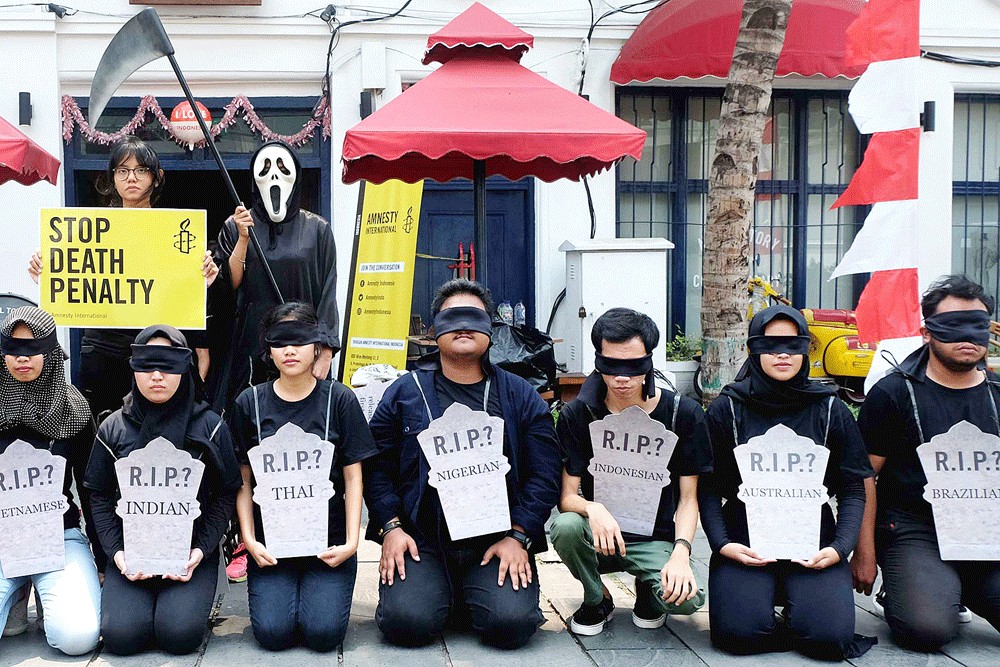Popular Reads
Top Results
Can't find what you're looking for?
View all search resultsPopular Reads
Top Results
Can't find what you're looking for?
View all search resultsRule of law first
Indonesia must avoid the perception of trading legal principles for diplomatic concessions.
Change text size
Gift Premium Articles
to Anyone
L
ast week, Philippine President Ferdinand Marcos Jr. announced on social media that Indonesia had agreed to allow Mary Jane Veloso, a Filipina on death row for drug trafficking, to serve her sentence in her home country after 14 years languishing in an Indonesian prison.
Days later, Law Minister Supratman Andi Atgas confirmed that President Prabowo Subianto had, in principle, approved the transfer of the five remaining members of the Bali Nine, Australians convicted of drug smuggling, to their home country, where their life sentences may or may not be commuted.
France has also sought leniency for its citizens imprisoned in Indonesia on similar charges.
These developments suggest a shift in Indonesia’s stance on capital punishment and prisoner management.
The Prabowo administration's decision to uphold an execution moratorium and signal a gradual move toward abolishing the death penalty is worthy of praise.
However, its approach raises concerns about legal clarity and consistency. Without a clear legal framework in place, such ad hoc decisions risk undermining Indonesia's commitment to the rule of law.
Indonesia currently lacks a law governing the transfer of sentenced persons, even though it has treaties for mutual legal assistance and extradition. While this legislative gap may soon be addressed, questions remain about the mechanisms for repatriating death row inmates.
Transferring such prisoners outside the sentencing jurisdiction sets a troubling precedent, potentially reducing judicial outcomes to political transactions.
This approach risks creating moral hazard. Allowing political will, no matter how well-intentioned, to supersede judicial rulings could erode public trust in the legal system.
At worst, such decisions may introduce legal uncertainty, undermine governmental credibility and signal to the international community that Indonesia’s rule of law is negotiable.
Prabowo would be better served by leveraging the mechanisms already in place.
Fortunately, Indonesia’s newly revised Criminal Code allows for a progressive approach to the death penalty. Inmates who have served over a decade on death row can undergo a review process, with the possibility of having their sentences commuted.
This policy reflects Indonesia’s slow but steady move toward abolishing capital punishment, in line with evolving global norms and the country’s aspirations to improve its human rights record.
Diplomatically, the proposed prisoner transfers may align with Prabowo’s broader “good neighbor” foreign policy, aimed at strengthening ties with regional and global partners.
However, Indonesia must avoid the perception of trading legal principles for diplomatic concessions.
Prabowo’s actions must demonstrate that Indonesia’s legal system is robust and not subject to external pressures, lest he is remembered as an Asian “paper tiger”.
For now, the President stands on better international footing than his predecessor, Joko “Jokowi” Widodo, who pursued an aggressive anti-drug policy that tarnished the nation’s reputation abroad.
That contrast underscores the need for consistency in how the death penalty is addressed in the country.
Prabowo must ensure that his stance is not seen as a political tool but as part of a principled and transparent policy shift.
Data from the Institute for Criminal Justice Reform shows that as of October 2023, there were 504 death row inmates in Indonesia, with 110 having languished in prison for over a decade.
These figures highlight the urgent need for a comprehensive strategy for managing the death penalty, rather than piecemeal decisions driven by political expediency.
The Prabowo administration has an opportunity to make history by leading Indonesia toward the abolition of capital punishment.
But it must do so through clear, consistent and lawful measures, not through backdoor deals that could erode public confidence in the justice system.
The rule of law must remain paramount, and any reforms must be firmly grounded in national interests and respect for human rights, not dictated by the shifting winds of geopolitical considerations.











